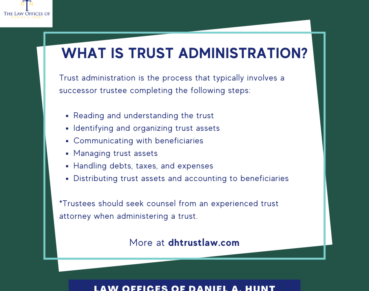Can a Trustee Sell Trust Property?

In the intricate world of estate planning and trust administration, understanding the roles and responsibilities of trustees is essential. One common question that trustees and beneficiaries ask is: Can a trustee sell trust property? The answer to this question is nuanced, dependent on various factors, and crucial for both trustees and beneficiaries to understand.
Trustee’s Fiduciary Duty
At the heart of the trustee’s role lies a fiduciary duty—a legal obligation to act in the best interests of the beneficiaries. This duty encompasses several responsibilities, including prudently managing trust assets and executing the trust terms according to the settlor’s wishes.
Does a Trustee Have the Power To Sell Property?
The authority to sell trust property can vary depending on the type of trust established.
- Revocable Living Trusts: During the settlor’s lifetime, they retain the power to modify or revoke the trust agreement, including the ability to sell trust assets. Upon the settlor’s incapacity or passing, the appointed trustee assumes control, with the power to sell assets as outlined in the trust document.
- Irrevocable Trusts: Once established, the settlor relinquishes control over trust assets, which are managed by the trustee. Irrevocable trusts often contain specific provisions authorizing the trustee to sell trust property, typically for the benefit of the named beneficiaries.
A trustee generally has the power to sell trust property without the permission of the trust’s beneficiaries as long as:
- The trust permits the trustee to do so
- The trustee acts in good faith and avoids self-dealing and conflicts of interest
- The property is sold at a fair market value
A trustee may sell trust assets including:
- Real property, such as a family home or vacation rental
- Stocks, bonds, or other investment accounts
- Automobiles
- Personal property
- Digital assets (if the trust contains the appropriate provisions)
Does a Trustee Own the Property?
A trustee does not personally own trust property, but they hold title to the property “as trustee of the trust”. They’re responsible for managing the property for the benefit of the named trust beneficiaries.
Does a Trustee Require Beneficiary Approval to Sell Property?
What if a trustee plans to sell a trust property but doesn’t have the approval of all the beneficiaries? Can the trustee sell trust property without all beneficiaries approving? Unless the terms of the trust state otherwise, a trustee generally has power under California law to sell assets without obtaining approval from all the beneficiaries.
However, if a trustee knows that one or more beneficiaries oppose the sale of a trust asset, selling the property could lead to trust litigation if a beneficiary decides to sue. To avoid litigation, a trustee should communicate clearly with the trust beneficiaries, and consider their wishes when making decisions.
At a bare minimum, a trustee should be able to communicate clearly why each property was sold and how that sale benefited the trust beneficiaries. The trustee may also use a Notice of Proposed Action and serve it upon the beneficiaries 45 days before selling the property to obtain the consent of the beneficiaries.
Can a Beneficiary Sue a Trustee for Selling Property?
Beneficiaries may wonder if there is any scenario in which they could sue a trustee for selling trust property. Yes, a beneficiary may have legal cause to sue a trustee for committing one or more of the following mistakes:
- Selling trust property without meeting specific terms outlined in the trust document
- Selling trust property for less than fair market value
- Engaging in self-dealing or creating a conflict of interest by acting in the trustee’s best interest and not the beneficiaries’
Seek Legal Counsel
When administering a trust, the trustee should always work with an experienced trust administration attorney to avoid potential missteps and breaches of fiduciary duty. When facing a sensitive or conflict-ridden trust administration, the trustee should find an experienced trust litigation attorney to guide them safely through this complex legal landscape.
If you’re a beneficiary who believes that the trustee has breached their fiduciary duty by selling a trust property in an inappropriate matter, consult an experienced trust litigation attorney for counsel.
If you have any questions about whether a trustee can sell trust property, feel free to contact our law firm.
Law Offices of Daniel A. Hunt
The Law Offices of Daniel A. Hunt is a California law firm specializing in Estate Planning; Trust Administration & Litigation; Probate; and Conservatorships. We've helped over 10,000 clients find peace of mind. We serve clients throughout the greater Sacramento region and the state of California.




